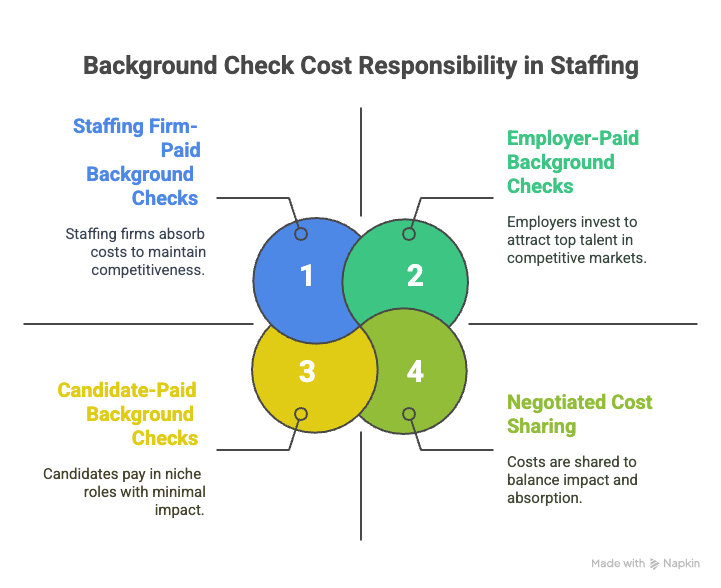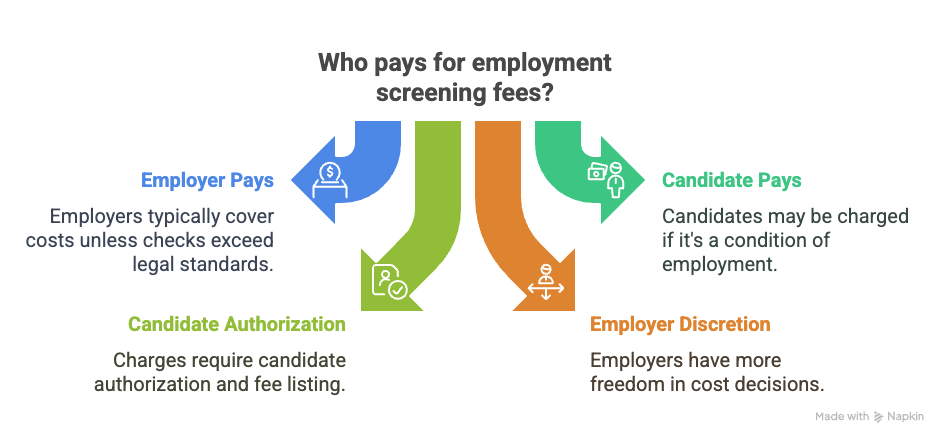Navigating the world of employment can be tricky, especially when considering the nuances of background checks. For both staffing firms and job seekers, understanding who shoulders the financial burden of these screenings is key. In this guide, we'll explore the responsibilities and legal requirements related to background check costs in the staffing industry. By the end, you'll have a clearer picture of who pays for what, and the factors influencing these decisions.
Key Takeaways
- Background checks confirm candidates' identities and qualifications, playing a critical role in hiring.
- The question of who pays for background checks depends on company policies, state laws, and market conditions.
- Adhering to Fair Credit Reporting Act (FCRA) requirements is essential to maintain legal compliance and protect candidate rights.
- State laws vary regarding who pays for background check fees, influencing hiring practices and candidate accessibility.
- Each stakeholderâemployers, staffing firms, and candidatesâfaces unique impacts and should assess responsibilities and opportunities tied to these fees.
Introduction
Background checks are a staple of the staffing world. They help ensure that candidates are who they say they are and possess the credentials they claim to have. Whether youâre a staffing agency, employer, or job seeker, understanding these screenings is crucial for navigating the hiring process effectively.
In staffing, one question looms large: who pays for these checks? Many are surprised by the range of factors, from company policies to state laws, influencing this decision. In this guide, weâll unravel who typically covers the cost of background checks and why it matters. By diving into the norms and regulations, we aim to equip you with the knowledge to make informed choices.
Understanding Background Checks
Background checks are integral to the staffing process, serving as a tool to verify an applicant's history and qualifications. Their purpose is straightforward: to ensure a candidate is suitable for the position and poses no risk to the workplace. The types of background checks can vary, including employment history, criminal record, education verification, and credit history. Each provides a piece of the puzzle that helps employers make an informed hiring decision.
In the staffing industry, background checks are more than just due diligenceâthey're about maintaining a safe and productive work environment. They help identify candidates who not only meet the qualifications but also align with the companyâs values and standards. Without them, you might be rolling the dice on hiring decisions, potentially leading to costly mistakes.
Have you ever thought about the implications of skipping background checks or not digging deep enough? It's a question worth considering. A bad hire could not only impact team dynamics but also your company's reputation. This is why background checks are not just a formalityâthey are a critical part of the hiring process.
Staffing Background Check Responsibility
In the staffing arena, background check costs can fall to different parties depending on various arrangements. Generally, staffing firms and employers are the most common payers. This allows companies to manage candidate flow without imposing initial costs on job seekers. When employers foot the bill, they often view it as an investment in reducing turnover and liability.
Candidates seldom cover these costs themselves, except for niche roles or industries where this is standard practice. Covering fees might turn potential employees away, impacting candidate pools. Some staffing firms might negotiate costs with clients, offering either to absorb them or pass them on as part of broader service fees.
Industry norms shape these practices. In high-demand fields, employers often handle fees to attract top talent swiftly. Conversely, in oversaturated job markets, staffing firms might pick up the tab to maintain competitiveness.

Delving into the specifics of who pays what reveals consistency in some sectors and variability in others. Regardless of arrangement, clarity is vital. As an employer or a staffing firm, ask yourself: Will absorbing these costs bolster your hiring strategy, or is there room to share the load? As a candidate, understanding expected responsibilities can aid in evaluating job offers and negotiating terms.
FCRA Compliance for Staffing Firms
The Fair Credit Reporting Act (FCRA) sets the standard for background checks, aiming to protect consumer rights. Staffing firms must understand and comply with these regulations to avoid legal pitfalls.
Understanding FCRA
The FCRA primarily governs how background checksâoften referred to as consumer reportsâare conducted. It ensures transparency and fairness in the handling of personal information. For staffing firms, knowledge of FCRA is crucial to maintaining trust and legal compliance.
Responsibilities Under FCRA
Consent and Disclosure
You'll need to get consent from candidates before a background check. This isn't just good practice; it's a legal requirement. Present a clear and separate disclosure outlining the intent to conduct a check. This document cannot be buried within other paperwork; it deserves its own space.
Accuracy and Dispute
Accuracy is a big deal. Ensure that the information you receive from screening companies is up-to-date and correct. If a candidate disputes the findings, you must investigate quickly. This means communicating with your vendor effectively and resolving the issue without unnecessary delays.
Adverse Action
Taking adverse action? Follow the steps methodically. First, give candidates a pre-adverse action notice along with a copy of the report and a summary of their rights. If you decide to reject them based on the report, send a final adverse action notice. This shows respect for their rights and keeps you in line with FCRA mandates.
Adhering to FCRA rules not only protects candidates but also shields your firm from potential lawsuits. Compliance isn't just about avoiding penalties; it's about fostering a transparent and fair hiring process.
State Laws on Employment Screening Fees
State laws around employment screening fees vary significantly, influencing who pays for background checks. In some states, employers or staffing agencies absorb the cost, while in others, candidates may be required to pay. These differences can impact hiring practices and candidate pool access.
Consider California as an example. Here, employers typically assume the costs unless the background check exceeds standards set by lawâfor instance, involving specific government positions. Meanwhile, in Tennessee, the law allows employers to charge candidates for background checks if it's a condition for employment, though this is less common in practice.
New York's laws make it clear that any charge for background checks must be authorized by the candidate. Employers also must provide a complete listing of relevant fees. Texas, on the other hand, imposes fewer restrictions, giving employers more discretion regarding these costs.
These variations underscore the importance of consulting state-specific resources when determining who pays. Employers and staffing firms should regularly review state labor websites and legal advisories to stay compliant and informed. For detailed state regulations, the Department of Labor's website is a useful starting point for up-to-date information.

Understanding state-specific laws helps you avoid unnecessary legal pitfalls and align practices with local regulations, ensuring a smoother hiring process across different jurisdictions.
Pros and Cons for Different Stakeholders
Employers: Paying for background checks can make your company more attractive to high-quality candidates. When candidates know up-front costs won't burden them, they might be more inclined to apply, giving you a broader talent pool to pick from. However, these costs add up, especially if your business operates in a high-turnover industry. Consider this aspect when budgeting for recruitment and retention strategies.
Staffing Firms: Covering background check costs can give your staffing firm a competitive advantage. Clients often prefer agencies that handle the entire hiring process without passing costs onto candidates. This can lead to more business but also means absorbing additional expenses. Balancing these costs is crucial, as is staying compliant with regulations. Successful firms often build these considerations into pricing strategies.
Job Seekers: When required to pay for their own background checks, candidates might face financial strain. This can discourage them from applying, potentially limiting their job opportunities. On the flip side, candidates who invest in their screening might appear more committed. As a job seeker, you should inquire upfront about who covers these fees to avoid surprises and plan accordingly.
Practical Tips for Managing Costs
For Employers
Streamline your background check process to save money. Work with a single reliable provider to get better pricing. Bulk orders can further reduce costs. Consider integrating background checks into your HR management system for efficiency. You might save money by reviewing what screenings are truly necessary for each role. A blanket policy can increase expenses without adding value.
For Staffing Firms
Negotiate costs with background check providers. Loyalty and volume may help lower rates. Develop standard operating procedures to minimize delays and errors, improving efficiency. Consider adjusting your service model: offer clients different tiers that include or exclude background checks. This could differentiate your firm in a competitive market.
For Job Seekers
Discuss background check fees upfront during negotiations. Clarify who pays before you commit to the process. If youâre responsible for the fees, ask if thereâs an employer reimbursement policy. This can be a question during your final negotiation stage. Understand the typical costs involved so you can plan accordingly. Keep communication open to avoid unexpected surprises.
Conclusion
Understanding who is responsible for paying background check fees in staffing is only part of the bigger picture. Each stakeholderâbe it employers, staffing firms, or job seekersâhas unique challenges and advantages in this landscape. Employers weigh the cost of checks against the benefits of attracting high-caliber talent. Staffing firms must balance compliance and competitiveness. Candidates aim to navigate the job market without undue burden. By grasping these aspects, you can make more informed decisions. Dive deeper into the specific laws relevant to your state and industry, and approach these costs proactively. Awareness and clarity are your allies in achieving fair and effective hiring practices.
Frequently Asked Questions (FAQs)
Can Staffing Agencies Legally Charge Candidates for Background Checks?
Yes, staffing agencies can charge candidates for background checks, but it depends on state laws and contracts between candidates and agencies. Some states prohibit such charges, so it's crucial to check local regulations.
How Much Do Background Checks Cost for Staffing Agencies?
Background checks typically cost between $20 and $100, varying based on the level of detail and geographic location. More comprehensive checks that include criminal history, credit reports, and education verification tend to be on the higher end.
What Are Best Practices for Handling Background Check Costs in Staffing?
Staffing agencies should clearly communicate who will cover the cost upfront. Having transparent policies helps avoid disputes. Consider including background check costs in your overall service fee to streamline the process.
What State Laws Affect Who Pays for Background Checks in Staffing?
State laws vary significantly. For example, California prohibits agencies from passing on background check costs to candidates. It's important to research your specific state's requirements and follow them closely.
Should Staffing Agencies or Clients Pay for Background Checks?
This depends on the agreement between the staffing agency and its clients. Some agencies absorb the cost to maintain competitiveness, while others require clients to pay. Discuss expectations during contract negotiations.
Are Candidates Obligated to Undergo Background Checks?
Yes, most staffing agencies require background checks as part of the hiring process. This helps ensure a safe and trustworthy work environment.
What Information Is Typically Included in a Background Check?
Background checks often include criminal history, employment verification, education verification, and sometimes credit history. The specific information depends on the position and industry requirements.
How Can Candidates Prepare for a Background Check?
Candidates should be truthful on their resumes and applications to avoid discrepancies. It's helpful to obtain copies of relevant documents, such as past employment records or transcripts, in advance.
What Happens If There Are Discrepancies in a Background Check?
Agencies usually reach out to the candidate to clarify any discrepancies. Candidates can address errors by providing additional documentation or explanations. Maintaining open and honest communication is key.
How Long Do Background Checks Take to Process?
Typically, background checks take a few days to a week to process. The duration depends on the complexity of the check and how quickly the agency can verify the information needed.
Definitions
Background Check
A background check reviews a candidateâs personal, professional, and criminal history to verify their identity and qualifications. Employers often use it to confirm employment history, education, criminal records, and sometimes credit reports. It helps reduce hiring risks and ensure a safe workplace. For example, confirming a candidate's degree or checking for past convictions can influence hiring decisions.
FCRA (Fair Credit Reporting Act)
The Fair Credit Reporting Act is a federal law that governs how employers conduct background checks using consumer information. It requires employers to get written consent, disclose intent clearly, and follow set procedures if the report influences a hiring decision. If negative information is found, candidates must receive a copy and have a chance to respond. Following FCRA helps avoid lawsuits and keeps the process fair.
Staffing Firm
A staffing firm connects employers with qualified job candidates. These agencies handle parts or all of the recruitment process, including screening, interviewing, and sometimes onboarding. Many also conduct background checks before placing employees. Some firms charge employers, while others absorb screening fees to stay competitive. If you're an employer looking to outsource hiring, a staffing firm can help manage the workflow.
Adverse Action
Adverse action is the process an employer follows when deciding not to hire someone based on a background check. Legally, the employer must first send a pre-adverse action notice, a copy of the report, and a Summary of Rights under the FCRA. Only after allowing time for a response can the employer issue a final adverse action notice. Skipping these steps can lead to FCRA violations. If you're a candidate, you have the right to correct errors before a final decision is made.
Employment Screening Fee
An employment screening fee covers the cost of running a background check. This can include verifying past jobs, education, criminal records, or credit history. Who pays depends on company policy and state lawâsometimes itâs the employer or staffing firm, rarely the candidate. In places like California, employers typically pay unless certain exceptions apply. If youâre a job seeker, always ask upfront if youâll be expected to cover this cost.
References
- https://www.shrm.org/topics-tools/news/talent-acquisition/how-much-reliable-background-check-cost
- https://selection.com/background-check-statistics/
- https://www.myshortlister.com/insights/background-check-statistics
- https://www.scoutlogicscreening.com/blog/what-is-the-cost-of-a-background-check/

GCheck Editorial Team
Meet the GCheck Editorial Team, your trusted source for insightful and up-to-date information in the world of employment background checks. Committed to delivering the latest trends, best practices, and industry insights, our team is dedicated to keeping you informed.
With a passion for ensuring accuracy, compliance, and efficiency in background screening, we are your go-to experts in the field. Stay tuned for our comprehensive articles, guides, and analysis, designed to empower businesses and individuals with the knowledge they need to make informed decisions.
At GCheck, we're here to guide you through the complexities of background checks, every step of the way.





